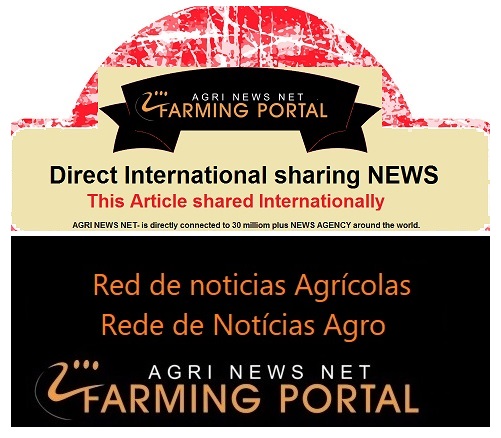World Farming Agriculture Commodity news - Weekly Updated - Exclusive and very popular -
France has stepped up its bird flu risk assessment to 'high' from 'moderate', it said on Friday in a decree that will trigger reinforced security measures around poultry farms, reported Reuters. Highly pathogenic avian influenza, commonly called bird flu, has been spreading faster among poultry in the European Union this season than in 2023, raising concerns of a repeat of previous crises that led to poultry deaths in the tens of millions and fears it could lead to human-to-human transmission. The heightened risk status follows confirmation of infection in migratory wild birds in neighboring countries and aims to strengthen surveillance and prevention measures, the agriculture ministry said. The change in status will take effect on Saturday. The upgrade to risk status in the seasonal assessment is kicking in earlier than last year, taking effect in early November rather than December. France has reported eight bird flu outbreaks on farms since the summer and last month launched a second vaccination campaign among farm ducks after a successful programme last year. The British government said on Tuesday that cases of bird flu had been confirmed at premises in Yorkshire, hours after it increased the risk level of the disease to 'high'.
Centre-right lawmakers in the European Parliament have made proposals to further weaken the European Union's beleaguered law to ban commodity imports linked to deforestation, a document seen by Reuters showed. In its current form, the landmark law would from Dec. 30 require companies importing soy, beef, cocoa, coffee, palm oil, timber, rubber and related products to prove their supply chains did not contribute to the destruction of the world's forests, or face hefty fines. Companies exporting commodities from Europe would face the same obligations.Brussels announced plans last month to delay the law's implementation by a year, until Dec. 2025, after intense opposition from trade partners including the US, Brazil and Malaysia.EU lawmakers - who, alongside EU member countries, are in the process of approving the delay - now also want to weaken parts of the law.A document seen by Reuters showed lawmakers from the centre-right European People's Party have proposed postponing the law by a full two years, and exempting from its obligations certain countries the EU deems to have an insignificant risk of deforestation.Sources familiar with the discussions said this would likely exempt exporters based in EU countries from the law's obligations - a move that could further rile foreign countries that have slammed the EU policy as protectionist.EPP is the biggest group in the EU Parliament, and any proposals it makes to weaken green policies are likely to win support from hard-right and far-right lawmakers .EU lawmakers had been expected to quickly approve a delay to the law. But the push to make extra changes raises the prospect of more complex negotiations that may not be resolved before the end of this year - when, unless the delay is formally approved in the coming weeks, the law would immediately take effect.An EPP spokesperson did not immediately respond to a request for comment.The EU deforestation policy law had been hailed as a landmark in the fight against climate change. The destruction of forests is a major cause of CO2 emissions, because it releases much of the planet-heating carbon stored by trees.

Meanwhile, verticillium isn’t a huge issue in Alberta. There may be a simple reason for this geographic variation — soil pH. Researchers at the University of Alberta have learned that Verticillium longisporum, the fungus that causes verticillium stripe in canola, is more potent when soil is slightly alkaline. Lab testing found that fungal colonies were larger when the pH was between 7.4 and 8.6.
“Along with that, the symptoms of infection in both seedlings and adult plants generally became more pronounced as soil pH increased, with disease severity at its worst at pH 7.8,” says a U of Alberta news release about the discovery. A group of plant pathologists at the U of A, including Becky Wang, have published their findings in horticulturae, an academic journal. Verticillium stripe was first discovered in 2014 in Western Canada in a canola field near Winnipeg. The soil-borne disease infects canola plants and produces tiny, pepper-like sclerotia on or inside the stem. The infection interferes with the uptake of water and nutrients. Symptoms include early ripening, plant stunting and leaf chlorosis and shredding or striping of the stem tissue. The symptoms usually appear later in the growing season. Over the last decade, the fungal disease has become commonplace in Manitoba and eastern Saskatchewan. The geographic extent of verticillium is unknown, but it continues to spread westward.
Stam BV is a European subsidiary of the ITL Group, ITL is valued at $1.2 billion and has established itself as a formidable force in the global tractor industry since its inception in 1969. With India’s largest single integrated manufacturing plant, boasting an annual capacity of 300,000 tractors, ITL ranks among the top five tractor manufacturers globally, with a strong presence in over 150 countries, including a notable footprint in Europe. Yanmar is a renowned name in agricultural machinery established in 1912 in Japan, known for its precision engineering and technological advancements. With over 112 years of experience, Yanmar has built a solid reputation in Europe’s agriculture and landscaping sectors, offering premium tractors recognized for their efficiency and reliability.
 World Farming Agriculture and Commodity news - Short update -04th November 2024
World Farming Agriculture and Commodity news - Short update -04th November 2024















